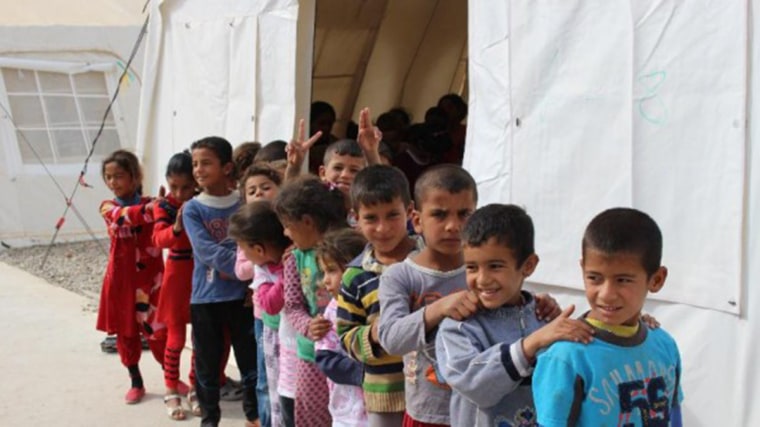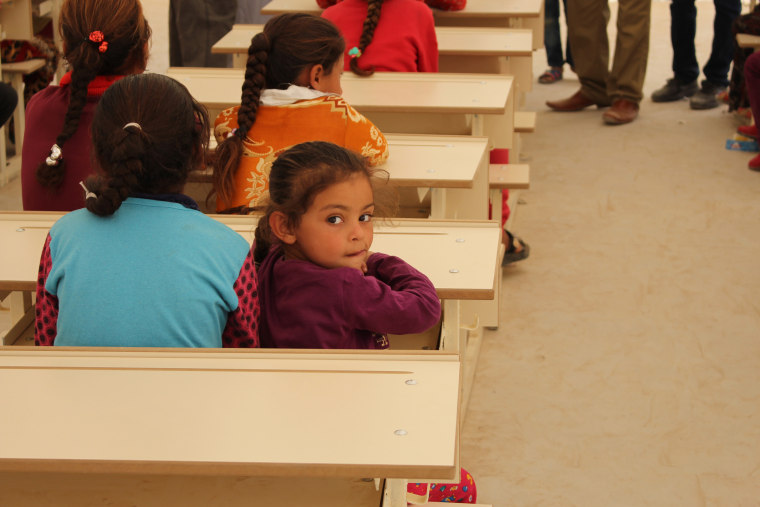DEBAGA, Iraq – Going back to school can feel a bit different when your school is a tent, your school supplies are donated hand-outs and your teachers are your classmates’ parents who have never taught a day in their lives.
But for the 1,000 children starting classes in the Debaga camp for displaced people south of Erbil, such differences are small compared to their biggest obstacle: Most of them haven’t seen the inside of a classroom in two years.
It’s a reality that has made education another casualty of war, turning these children into remedial students at tender ages.
But that hasn’t dampened the enthusiasm among parents and students.
“We’re hoping that the future will be better, better for the children, god willing,” said Aya, whose 12-year-old granddaughter Malak last week attended her first days of school in the camp.
“She can become a doctor, an engineer, a teacher," said her grandmother, who only gave her first name out of fear for the safety of her family.
Malak piped up, with a shy grin: "I want to help people and being a doctor is nice."
Free from ideological indoctrination
For girls like Malak, the alternative under ISIS rule was no education at all. But for boys, the education offered by ISIS amounted to little more than ideological indoctrination and basic martial training.
Instead of counting apples or pencils, they counted pictures of guns and grenades, some children said.
One said an ISIS teacher brought a Kalashnikov to the front of the classroom and delivered a lesson in field-stripping the gun.
Hate was a prominent feature of the curriculum: the students, all of them Sunni Muslims, were told of the evils of Iraq’s Shiite majority and taught to fear Iraq’s Shiite-dominated military who are now fighting to liberate Mosul.
"All they have known is violence"
Such stories are consistent with ISIS propaganda. In many cases, the group has placed trained youth on its front lines. Even some of the group’s most recent videos show children, clad in fatigues, delivering threatening speeches to the camera before executing accused traitors with handguns.
Most of the children in Debaga camp were able to avoid such a fate. Parents could normally withdraw children from school by saying that the 75,000 Iraqi dinar ($64) annual cost was too much to pay. Given the deprivation under ISIS rule, it was a credible claim that the jihadis tended to accept, said adults in the camp.
Aid workers acknowledge that the conditions in the camp are not ideal, particularly the lack of professional teaching staff. But the task is essential, not only to help individual children but to safeguard Iraq’s future, said Pernille Ironside, the chief of field operations in Iraq for the United Nations Children’s Fund (UNICEF), which is helping to finance the schools in Debaga and at other camps throughout Iraq.
“Many children, for the last few years, all they have known is violence,” said Ironside. “This has to stop and education is the entry point for that.”
Now it’s up to relief agencies to make up for lost time — and not just in terms of classroom instruction. The children who avoided school still suffered the trauma of war.
Allowed to sing again
Medical workers near Mosul now treat up to a dozen children a day for war-related injuries, including bomb blasts, gunshot wounds and severe burns, according to a recent report from Save the Children International, a global charity.
Not far from the improvised classrooms — rows of white tents emblazoned with the UNICEF logos — another line of tents serves as a recreational space for younger children.

This week, they looked like lively day care centers. Bare-footed volunteers in UNICEF vests played games with children and danced to Arabic pop songs. That’s another novelty: Music was banned under ISIS and adults caught listening to contraband tunes could be flogged or even killed.
It’s a kind of play therapy, explained a UNICEF employee who was not authorized to speak to the media.
When the music stops, the aid workers use the tents for more specialized therapy sessions to help traumatized children. Some children still break down into tears when they hear airplanes flying overhead, the UNICEF employee said.
Malak appears like a normal, carefree child to the casual observer. For her and her friends, the camp is a place to roam around and play games.
“I’m happy to be with my friends. We spend good times together. We’ve been given books and we have lessons,” she said with a smile.
For Malak’s grandmother, the feeling is more of relief. Their family had no income under ISIS rule and they had to scrape for food. Now, at least her family’s basic needs for food, water and clothing have been met.
“We hope that from today, our kids will have a brighter future,” she said.
But when asked about her children’s schooling under ISIS, her answer was brief.
“We’ve forgotten about it,” she said. “There was nothing.”

